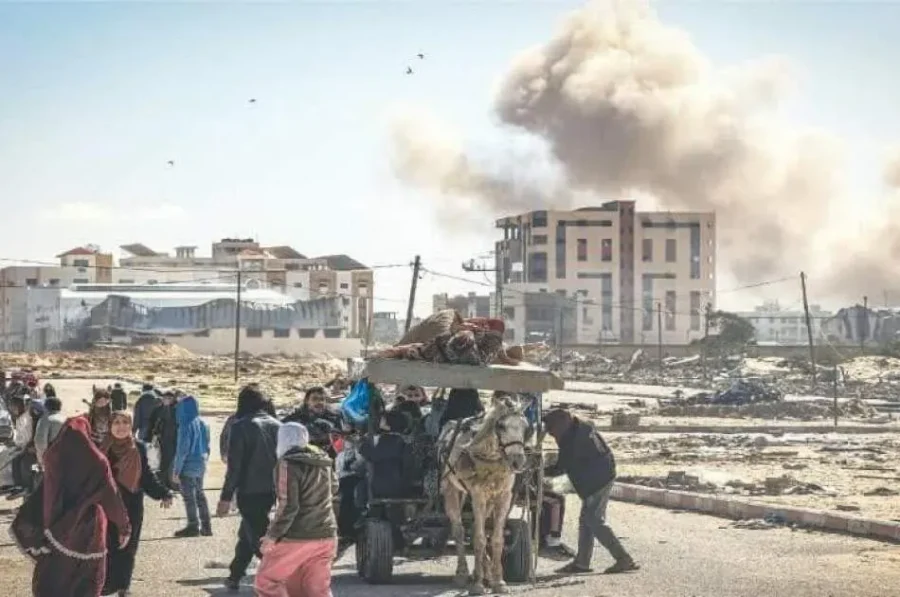Artillery fire pounded southern Gaza early on Thursday as Israel said it had begun “flooding Hamas tunnels” and mediators sought a halt to the nearly four-month hostilities.
The focus of the fighting in recent weeks has been Khan Yunis, the southern Gaza Strip’s main city, where a constant barrage of air strikes and shelling rent the air all night.
The health ministry recorded 125 deaths across southern Gaza in the latest Israeli strikes. United Nations agencies’ chiefs said a bitter row over the main aid organisation for Palestinians could “have catastrophic consequences for the people of Gaza”.
Major donors, including the United States and Germany, have suspended funding to the UN agency for Palestinian refugees, UNRWA, over accusations that several staff members were in-volved in the Oct 7 raids in Israel.
Withholding the funds was “perilous and would result in the collapse of the humanitarian system in Gaza”, the heads of the UN agencies said in a joint statement.
Meanwhile, mediation efforts gathered pace following a Sunday meeting of top US, Israeli, Egyptian and Qatari officials that produced a proposed framework for a new truce and prisoner release.
The Israeli army said on Wednesday its troops had killed 15 “terrorists” in northern Gaza, and captured 10 “militants” during an attack on a school where they were allegedly hiding.
In Khan Yunis, where the Hamas media office said there were “dozens of air raids” overnight, vast areas have been reduced to a muddy wasteland of bombed-out buildings.
According to witnesses, artillery shells hit the area of Nasser Hospital, the city’s largest, where the UN humanitarian agency OCHA has said thousands of displaced Palestinians are sheltering.
Eyewitnesses reported people fleeing Khan Yunis on Tuesday as explosions sounded nearby. “We left Nasser Hospital… under tank fire and air strikes. We didn’t know where to go,” said one woman.
“We’re out in the cold, left to fend for our-selves.” The Palestinian Red Crescent said on social media platform X that “Israeli shelling and gunfire continue” around another hospital in Khan Yunis.
Staff and patients at the Red Crescent’s Al Amal Hospital “and thousands of displaced people, primarily children and women, live in constant fear and anxiety”, it said.
Israel accuses Hamas of operating from tunnels under hospitals in Gaza and of using medical facilities as command centres, a charge denied by the Palestinian group.
The Israeli military said it had begun “flooding the tunnels” with water in a bid to “neutralise the threat of Hamas’s subterranean network”.
Qatar, which helped broker a previous truce and prisoner release in November, voiced hope an initial deal now being negotiated might lead to a “permanent ceasefire”.
A Hamas official said the group is “open to discussing all issues, including prisoner exchange and reconstruction of the Gaza Strip”.
The official reiterated Hamas’s demand for a comprehensive and complete cessation of Israel’s aggression and the withdrawal of its troops from Gaza.
Israeli Prime Minister Benjamin Netanyahu, whose office earlier called the negotiations “con-structive”, ruled out releasing “thousands” of Palestinian prisoners as part of any deal.
“I would like to make it clear… We will not withdraw the army from the Gaza Strip and we will not release thousands of terrorists. None of this will happen,” he said on Tuesday.
A pro-Iran group in Iraq, Kataeb Hezbollah, said it would halt attacks on US “occupation forces, in order to prevent embarrassment to the Iraqi government”.
The United States and Britain have also launched a campaign of air strikes against Yemen’s Houthis, who have carried out repeated attacks on shipping in the Red Sea in solidarity with Palestinians in Gaza.
The Houthis said on Wednesday they had fired “several” missiles at a US warship, hours after the US military said it had shot down another anti-ship missile over the vital trade route.—AFP










